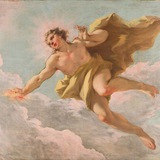Forwarded from Orthodox Temple of Natural Religion
The Gods truly exist and hence, like all truths, must be heeded to bring us to the Good and for us to realize good and right action. The Good emanates all Being, and the Divine Intelligence was the first thing to arise from this outpouring of life and being. The Divine Intelligence contemplated its Being and celebrated its various aspects and potentialities, which became the heavenly Gods, the Ideas. Then, the Divine Will arose, taking these Gods/Living Ideas, and directing them into unorganized matter (hyle), shaping it according to his vision, creating the heavens and then the earth for the purification of souls. The Gods are our way to realize the Highest One, the Good, purify ourselves, actualize divinity, and realize our divine destiny; they are spiritual paths, they are the principles at work in the universe, and they are perfect living super-persons that care about humanity, work with us, and exhort our contemplation, adoration, and service of them. The imprints of the Gods can be found in the substances of this world, and these substances can be used by Priests in theurgy (god-serving magic) to channel divine energy to order the world according to the Gods, and Laity can use basic substances, universal offerings, and prayers to perform the theurgy appropriate to their station in the ecclesiastical hierarchy. We worship the Gods, because we seek to understand them and grow in understanding of ourselves, our world, and divinity; because we wish to improve ourselves and become greater; because we wish to celebrate, enjoy, and refresh ourselves in the Divine Beauty of Being; because we are compelled to them; and because we realize ourselves through them, as we are extensions of them playing in this world. Take these words to heart, dear followers. Study the Gods, read their mythologies, pray to them and worship them, and contemplate them, and your understanding and the fire of your devotion will grow. Above all, begin actualizing your divinity through your participation in a true natural religious organization such as our excellent Temple.
🔥17👍2
In the Homeric Hymn to Apollo, when Apollo is presented with an opponent who threatens to destabilize the order he wishes to impose on the cosmos (e.g. Pytho or Telphousa), he eliminates them and takes their names. In the HH Hermes, we are presented with another way for a god to gain recognition among the Olympians. Rather than destroying his opponents, Hermes allows Apollo to hold onto his τιμαί so long as he is willing to join in friendship. Through his own inventiveness, Hermes is able to open up parallel spaces within the established cosmos. As a result of Hermes’ exploits, we are reminded of the importance of thinking about the Greek pantheon as a dynamic system in which our understanding of the cosmos comes from the complementary and competing attributes of the Olympian gods.
Reconsidering Zeus’ Order: The Reconciliation of Apollo and Hermes by Christopher Bungard
Reconsidering Zeus’ Order: The Reconciliation of Apollo and Hermes by Christopher Bungard
❤9🙏3🔥2
All fortune is good fortune; for it either rewards, disciplines, amends, or punishes, and so is either useful or just.
Boethius
Boethius
❤20🔥3
Forwarded from Orthodox Temple of Natural Religion
Abandon all folly and arbitrary revelation, subordinating thyself to nothing but reason. May we abandon this ignorance and advance to a greater age, and may we celebrate together there in times ahead. 🙏🏻
❤8👍1
